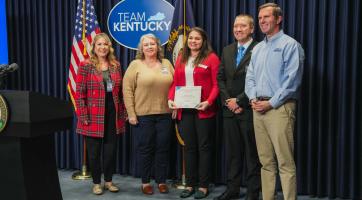Civil rights advocate, Holocaust survivor recalls time in Gastonia as youth
By Dashiell Coleman dcoleman@gastongazette.com
Posted Jun 13, 2019 at 5:05 PM Updated Jun 13, 2019 at 5:05 PM
John Rosenberg remembers his high school years in Gastonia fondly.
The experience stuck with him enough that he regularly attends reunions of the Gastonia High class of 1949. And, truly, Rosenberg was fortunate to be here. Just a decade earlier, his family fled Nazi Germany after his father was briefly imprisoned in a concentration camp.
As a child, his home was the German industrial city of Magdeburg, about 75 miles southeast of Berlin. His dad, Rudolf, was a teacher, and the family lived in an apartment near a synagogue. On Nov. 9, 1938 — the date that would become the infamous Kristallnacht — Rudolf was arrested in front of the family. Then, the Nazis bombed the synagogue.
“I have a pretty vivid recollection of Kristallnacht when they bombed the synagogue,” Rosenberg said. ”... They took my father away. We were out there watching all this awful stuff, brought out all the prayer books and the Torahs and made a big bonfire in our yard. They tore up our apartment. It was a pretty scary event.”
Rudolf was sent to a concentration camp, where he was kept for about two weeks before being released and told to leave Germany. The family made their way to a detention camp in the Netherlands. Eventually, a family member in New York sponsored the Rosenbergs, and they made their way across the Atlantic.
Rudolf heard through the grapevine that there were Jewish communities in Spartanburg, South Carolina, and Gastonia without a rabbi. He was a para-rabbi who was certified as a Jewish school teacher, and he went South to help.
“He came South on his own and started alternating weekends, riding on the bus between Gastonia and Spartanburg, and he started sweeping the floors at a textile mill during the week,” Rosenberg said.
Before long, Rudolf saved up enough money to move the family from New York. First, they stayed in Spartanburg but eventually moved to Gastonia, where Rudolf had worked his way up from janitor to supervisor at a textile mill in nearby Lowell. Rudolf was active in the temple, and often conducted services.
Rosenberg recalls his dad knowing the Five Books of Moses by heart in Hebrew.
“You could start my dad anywhere in there, and he could keep on going,” Rosenberg said. “He knew the whole thing by memory. When he was going back and forth between Gastonia and Spartanburg, he was really still learning the language.”
Gastonia seemed like a nice place to Rosenberg — especially compared to Nazi Germany. He was active in sports as a teenager and even became president of his high school class. As an adult, though, when he was working as a civil rights attorney, he would recall segregation and other racist norms of the South at the time. He says Jews weren’t allowed at the country club when he was growing up here, but the discrimination wasn’t as widespread as it was against blacks.
A powerful moment for Rosenberg came after his undergraduate years at Duke, when he was in the Air Force and had a few days leave. He and a fellow service member, an African-American officer from Charleston, South Carolina, boarded a train in New York to head south to visit their families. Around Washington, his colleague had to switch cars and head to the back of the train for the rest of the trip.
“I always identified that as a defining moment,” Rosenberg said. “I think it made me feel how wrong it was and to be much more aware of the fact that the system had to change.”

